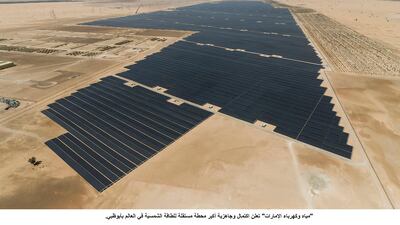A consortium led by Abu Dhabi National Energy Company (Taqa) and Masdar, in partnership with France’s EDF Renewables and China's JinkoPower, reached financial close on the world’s largest solar power plant in Abu Dhabi.
The 2-gigawatt Al Dhafra Solar PV plant is being financed by seven international banks, Taqa said in a statement on Tuesday.
"The financial closing of the world’s largest solar plant marks the beginning of an important chapter for this IPP [independent power producer] project, for Taqa Group and for the UAE as we continue to deliver on our bold clean energy ambitions, while demonstrating the commercial and operational viability of utility-scale single-site solar projects,” Jasim Husain Thabet, group chief executive and managing director of Taqa, said.
Taqa will own 40 per cent of the Al Dhafra project, while Masdar, EDF Renewables and JinkoPower will each have a 20 per cent stake. The plant is expected to become fully operational in 2022 and will generate enough electricity for about 160,000 homes across the UAE.
“We have an expanded portfolio of power and water assets that we will grow further through a disciplined approach, adding value for our shareholders and delivering a diverse supply of energy for our stakeholders and the communities in which we operate," Mr Thabet said.
Earlier in the year, bidding for the project led to one of the world's most competitive tariffs for solar power, which was set at Dh4.97 fils per kilowatt hour ($1.35 cents/kWh). The tariff was further improved to Dh4.85 fils/kWh “primarily driven by hedging and financing cost improvements, in addition to other optimisation efforts”, Taqa said.
The project “underlines the growing appeal of renewable energy from both a commercial and environmental perspective, and the attractiveness of the UAE as a location for the world’s largest and most cost-competitive renewable energy projects,” Mohamed Jameel Al Ramahi, chief executive of Masdar, said.
The UAE is diversifying its energy mix and turning to solar and nuclear energy as it looks to free up hydrocarbons for export markets and generate up to 44 per cent of its energy from clean sources by 2050.


